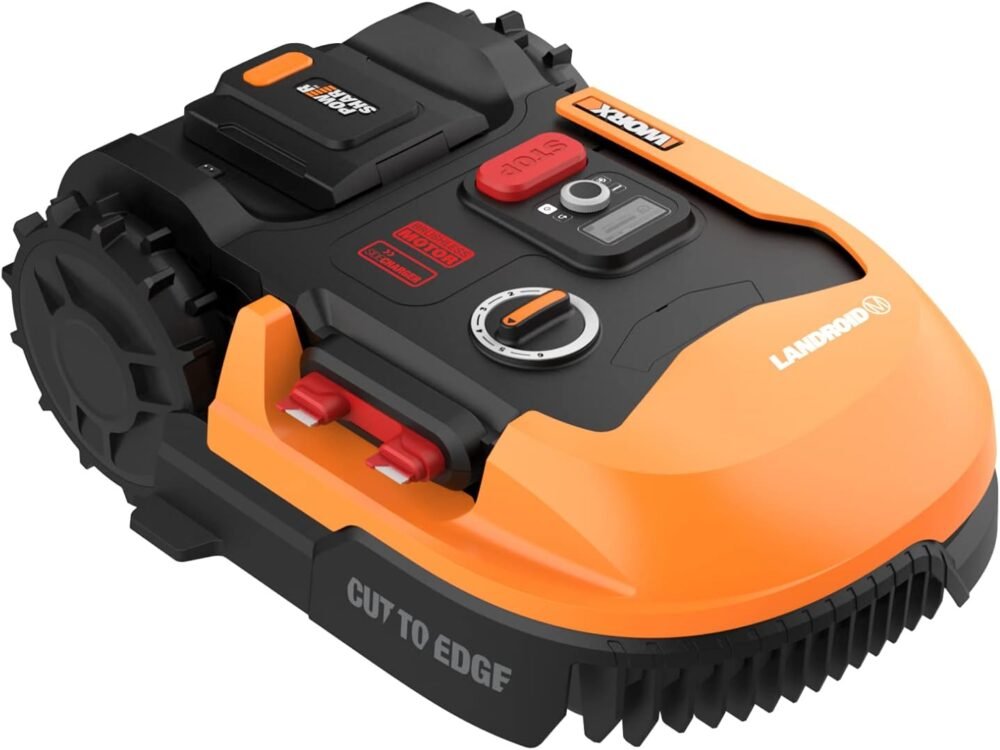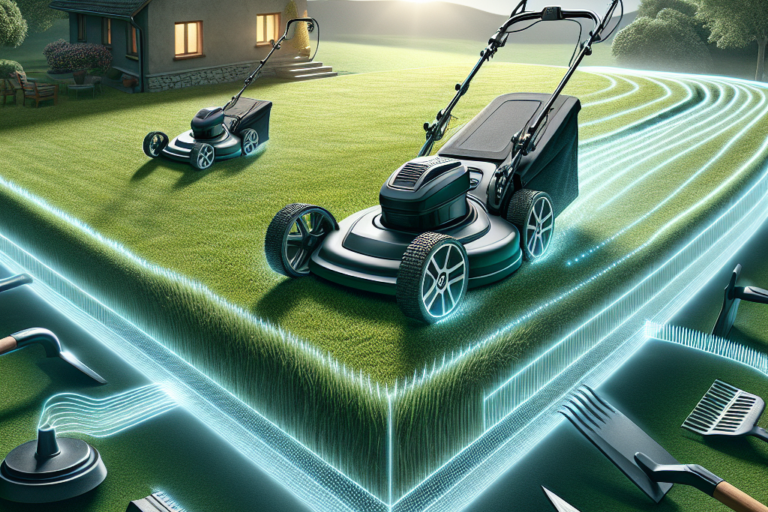Have you ever wondered how electric lawn mowers stack up against their robotic counterparts? Both options offer a convenient and eco-friendly solution for maintaining your lawn, but they differ in terms of technology, ease of use, and overall performance. In this article, we’ll explore the key differences between electric lawn mowers and robotic lawn mowers, helping you make an informed decision for your lawn care needs. So, let’s get started and find out which mower best suits your green thumb!
Cost
Initial Cost
When it comes to comparing the initial cost, electric lawn mowers tend to be more affordable than their robotic counterparts. Electric mowers are widely available and come in a range of prices to fit different budgets. Whether you choose a corded or cordless electric mower, you can find options that are cost-effective and meet your needs. On the other hand, robotic lawn mowers typically have a higher initial cost due to their advanced technology and automated features. These innovative machines require a larger investment upfront.
Maintenance Cost
In terms of maintenance cost, electric lawn mowers also have an advantage. They have fewer moving parts compared to robotic mowers, which means there are fewer components that can break or require repairs. Electric mowers generally have lower maintenance costs, as they don’t have the complex systems and technology found in robotic mowers. Additionally, electric mowers don’t require regular blade sharpening, as most models use durable blades that stay sharp for an extended period of time. Robotic mowers, on the other hand, may require occasional maintenance and blade sharpening, which can incur additional costs.
Performance
Cutting Power
Both electric and robotic lawn mowers are designed to effectively cut grass, but there are some differences in their cutting power. Electric mowers typically have a consistent cutting power throughout their operation, providing reliable and efficient cutting performance. Robotic mowers, on the other hand, may have slightly lower cutting power due to their compact size and battery-powered motors. However, modern robotic mowers are designed with advanced cutting systems that ensure an even and precise cut, compensating for any potential differences in cutting power.
Cutting Width
When it comes to cutting width, electric lawn mowers often offer a variety of options to suit different lawn sizes. From compact models with a narrower cutting width to larger models with wider cutting decks, electric mowers give you the flexibility to choose the best fit for your lawn. Robotic mowers, on the other hand, generally have a fixed cutting width that may be smaller than some electric mowers. However, the ability of robotic mowers to operate autonomously and navigate the lawn multiple times can compensate for the narrower cutting width, ensuring a thorough and evenly cut lawn.
Speed
In terms of speed, electric lawn mowers tend to be faster than robotic mowers. Electric mowers can be manually pushed or self-propelled, allowing you to adjust the speed according to your preference and the terrain of your lawn. Robotic mowers, on the other hand, typically operate at a slower speed to ensure accurate navigation and avoid obstacles. While they may not be as quick as electric mowers, robotic mowers prioritize precision over speed to deliver meticulous results.
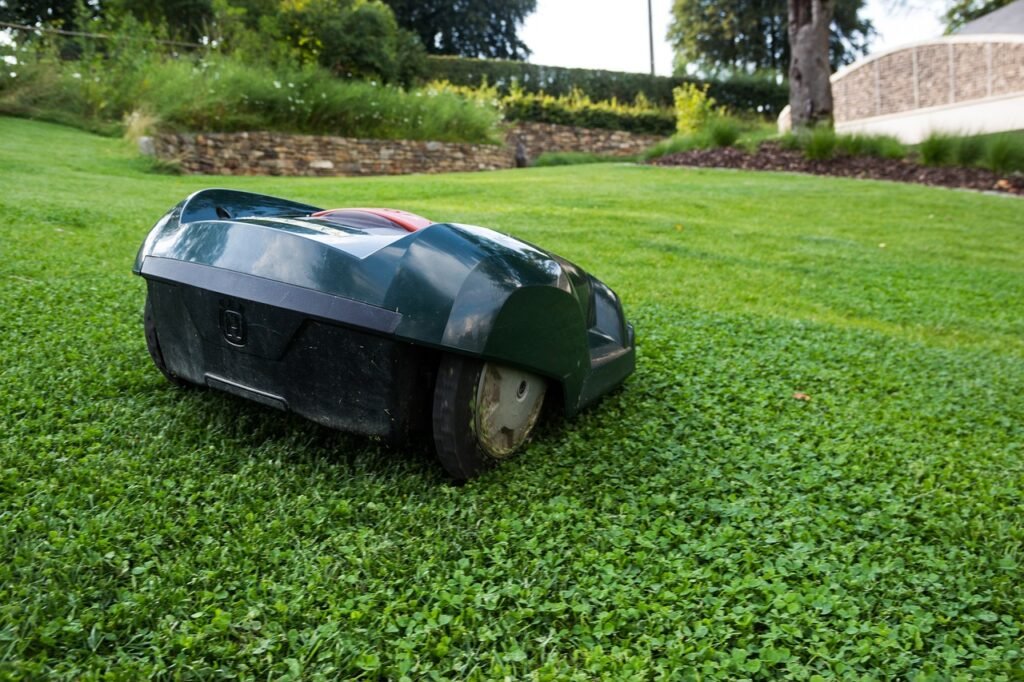
Ease of Use
Manual Operation
Electric lawn mowers are generally easy to use, especially if you opt for a self-propelled model. With a self-propelled electric mower, the machine does most of the work for you, requiring minimal effort to maneuver and push through your lawn. Cordless electric mowers offer even greater convenience, as they eliminate the hassle of tangling cords and provide greater freedom of movement. Robotic lawn mowers, on the other hand, offer the ultimate ease of use by eliminating the need for manual operation altogether. Once set up and programmed, robotic mowers operate autonomously, taking care of your lawn without any physical effort required from you.
Programming and Scheduling
Robotic lawn mowers excel in terms of programming and scheduling capabilities. These advanced machines come with user-friendly interfaces that allow you to easily set up a mowing schedule based on your preferences and lawn size. You can specify the days and times you want the robotic mower to operate, ensuring that your lawn is consistently maintained without any manual intervention. Electric mowers, on the other hand, do not offer programming and scheduling features as they require manual operation. You have full control over the timing and frequency of using an electric mower, but it requires your active participation.
Maneuverability
Turn Radius
When it comes to maneuverability, electric lawn mowers typically have a smaller turn radius compared to robotic mowers. Electric mowers are designed to be easily maneuvered around tight corners and obstacles, allowing you to navigate your lawn with precision. This makes them particularly suitable for small yards or areas with intricate landscaping. Robotic mowers, although they can navigate obstacles autonomously, may have a wider turning radius due to their size and maneuvering capabilities. They may require larger areas for turning, which can be a limitation in smaller yards with limited space.
Navigating Obstacles
Both electric and robotic lawn mowers are equipped with features to navigate obstacles, but they employ different strategies. Electric mowers generally rely on the user’s guidance to steer clear of obstacles, offering a more hands-on approach. On the other hand, robotic mowers utilize advanced sensors and technology to detect and avoid obstacles automatically. They are designed to change direction when encountering objects or obstructions, ensuring they can maneuver around your lawn safely. This feature can be particularly useful if you have a yard with numerous trees, flower beds, or other obstacles that may pose a challenge for manual operation.
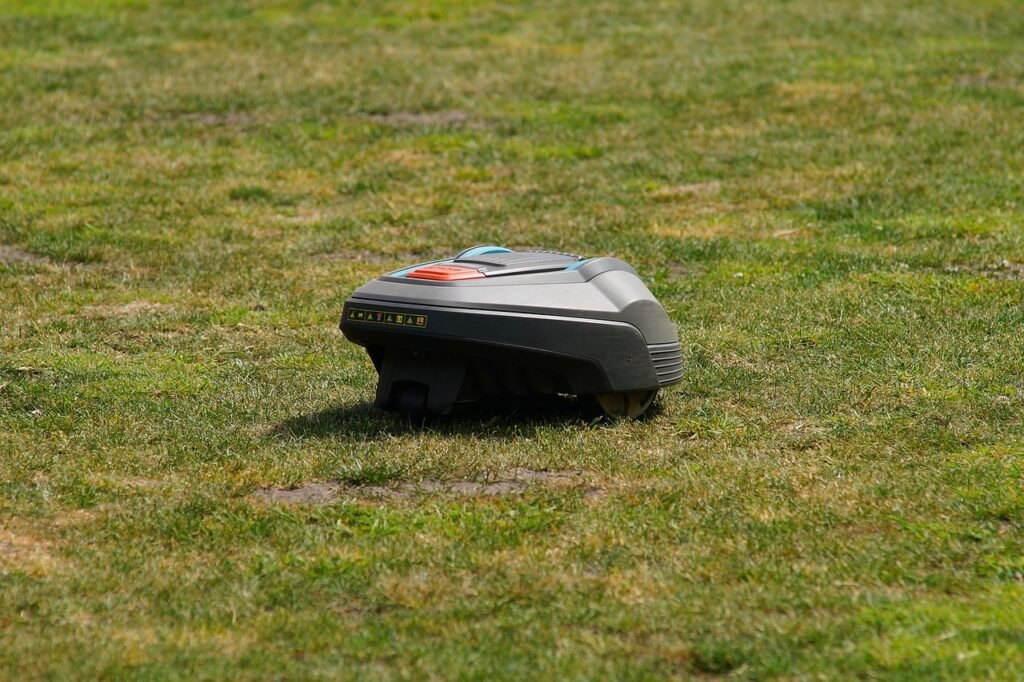
Noise Level
Electric Lawn Mowers
In terms of noise level, electric lawn mowers are significantly quieter compared to gas-powered mowers. Electric mowers operate with reduced noise, making them more pleasant to use and allowing you to mow your lawn without disturbing neighbors or household members. They provide a more peaceful mowing experience, contributing to a more serene outdoor environment.
Robotic Lawn Mowers
Robotic lawn mowers are known for their whisper-quiet operation. These machines produce minimal noise while mowing, ensuring a peaceful and undisturbed outdoor environment. With noise levels as low as 60 decibels, robotic mowers are significantly quieter compared to both gas and electric mowers. This is particularly advantageous if you have noise restrictions in your neighborhood or if you simply prefer a tranquil lawn care experience.
Environmental Impact
Emissions
Electric lawn mowers are the clear winners when it comes to environmental impact. They produce zero emissions during operation, making them an eco-friendly choice. By opting for an electric mower, you are reducing air pollution and your carbon footprint. On the other hand, gas-powered mowers, including those with self-propelled capabilities, emit greenhouse gases and contribute to air pollution. Robotic mowers are also eco-friendly, as they typically use electric power and produce zero emissions while mowing.
Energy Consumption
Electric lawn mowers and robotic mowers both require electricity to operate, but their energy consumption can vary. Electric mowers, whether corded or cordless, can consume varying amounts of electricity depending on their power and the duration of use. However, they are generally more energy-efficient compared to gas-powered mowers. Robotic mowers are designed to optimize energy consumption, as they run on rechargeable batteries that can be charged during non-mowing hours. These batteries are typically designed to provide sufficient power to complete a mowing session before requiring recharging.
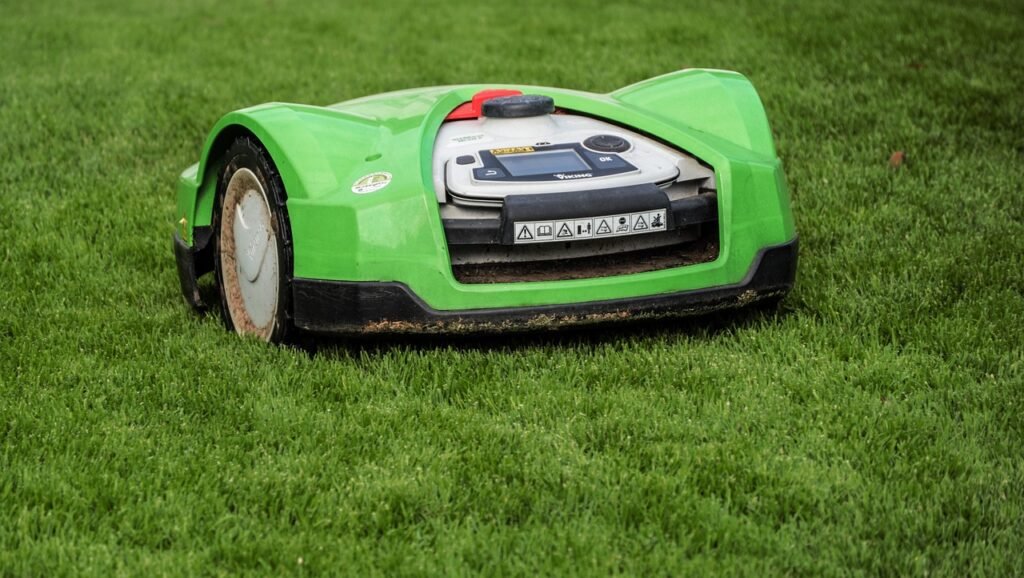
Safety Features
Blade Stop
Both electric and robotic lawn mowers prioritize safety, and one of the key safety features they offer is a blade stop mechanism. Electric mowers usually come with a safety switch or handle that needs to be engaged for the blade to start spinning. This ensures that the blade remains motionless when not in use or when the mower is not in the correct operating position. Similarly, robotic mowers are equipped with sensors that detect when the machine is lifted or tilted, causing the blades to immediately stop. This helps prevent accidental injuries during maintenance or if the mower is disturbed.
Obstacle Detection
Robotic lawn mowers excel in obstacle detection capabilities, thanks to their advanced sensors and technology. These sensors allow the mower to detect and avoid obstacles, such as trees, rocks, or toys, during operation. When an obstacle is detected, the robotic mower changes direction and continues mowing, ensuring it navigates around the obstruction. Electric mowers, on the other hand, rely on the user’s vigilance and guidance to avoid obstacles, as they don’t have the built-in sensors and automated obstacle detection found in robotic mowers.
Lawn Size
Small Yards
Electric lawn mowers are well-suited for small yards. Their compact size and maneuverability make them ideal for navigating tight spaces and cutting small lawns. Whether you choose a corded or cordless electric mower, you can easily maneuver around small yards, ensuring efficient and precise mowing. Electric mowers provide the flexibility to adjust the cutting height to match the needs of your grass and maintain a neat and well-groomed lawn.
Large Yards
For larger yards, robotic lawn mowers offer convenience and efficiency. These autonomous mowers are designed to operate for extended periods, covering large areas without the need for manual intervention. You can program the robotic mower to mow at specific times and on specific days, ensuring consistent maintenance of your lawn. Robotic mowers are also capable of navigating complex terrain and inclines, making them suitable for larger yards with varying topography.
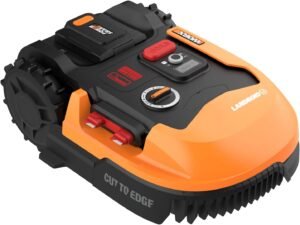
Maintenance
Blade Sharpening
When it comes to blade sharpening, electric mowers have a clear advantage. Most electric mowers are equipped with durable blades that retain their sharpness for extended periods, reducing the need for frequent sharpening. Some models may even have self-sharpening blades that maintain their sharpness throughout the mowing season. Robotic mowers also have blades that can stay sharp for a while, but they may require occasional sharpening depending on the frequency and intensity of use.
Battery Replacement
Electric mowers, whether corded or cordless, don’t require battery replacement as they are directly powered by electricity. However, cordless electric mowers may require periodic battery maintenance and replacement in the long run. Robotic mowers, on the other hand, rely on rechargeable batteries to operate autonomously. These batteries typically have a lifespan of a few years and may need to be replaced once their performance starts to decline. The frequency of battery replacement will depend on factors such as the manufacturer’s specifications, the size of your lawn, and the intensity of use.
Conclusion
Factors to Consider
When comparing electric lawn mowers to robotic lawn mowers, there are several factors to consider. The initial cost, maintenance cost, cutting power, cutting width, speed, ease of use, maneuverability, noise level, environmental impact, safety features, lawn size, and maintenance requirements all play a role in determining the right mower for your needs.
Choosing the Right Mower
Ultimately, the choice between an electric lawn mower and a robotic lawn mower depends on your specific preferences, budget, lawn size, and maintenance capabilities. Electric mowers are generally more affordable, offer greater cutting power, and provide flexibility for manual operation. On the other hand, robotic mowers offer autonomous operation, advanced programming capabilities, and superior maneuverability for larger yards. Consider your requirements and prioritize the factors that are most important to you to make an informed decision on which mower suits your lawn care needs.
